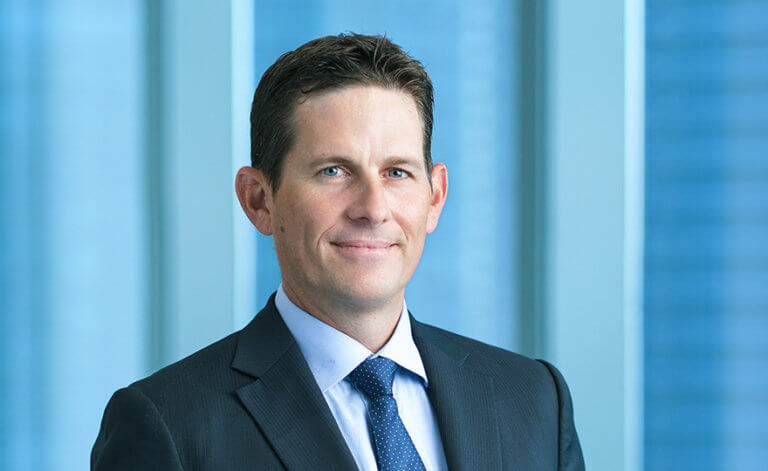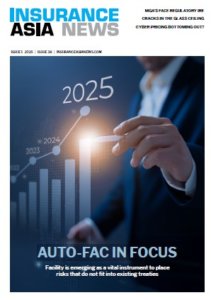Q&A: Swiss Re Corporate Solutions’ Jonathan Rake
February 3 2022 by InsuranceAsia News
InsuranceAsia News (IAN) recently caught up with Jonathan Rake, Asia Pacific chief executive of Swiss Re Corporate Solutions.
Singapore-based Rake discussed the impact of Covid-19, business recovery and alternative risk transfer mechanisms.
IAN: How do you see the continuing Covid-19 outbreak affecting the Asia insurance market in 2022?
Rake: The Covid-19 pandemic has cemented positive paradigm shifts for insurance. In most markets in the region, we see a significant increase in risk awareness as a strong demand driver for insurance solutions as well services such as risk engineering. Corporate risk managers are now more risk alert and we see many clients revisiting their risk registers looking for gaps in cover and possible exposures they might have underestimated in the past.
We’ve been working with clients to implement new risk engineering techniques using drones and 3D modelling to generate more accurate data and provide a better understanding of risk exposures. Throughout various lockdowns over the last two years, the use of remote site surveys have been instrumental when access to a physical site is restricted, making continued risk mitigation possible.
IAN: In which specialist areas are you anticipating market growth in Asia over the next 12 months?
Rake: Covid-19 has been a “wake-up call” for higher risk awareness, and the same is true for recent natural catastrophe events, translating into more demand for risk protection across many lines of business. Global insured catastrophe losses rose to US$112 billion in 2021, the fourth highest on record, Swiss Re Institute estimates, and secondary perils are on the rise, contributing to 50% of the annual natural catastrophe insured losses, on average.
The pandemic has also accelerated the hard market trend and with that we are seeing increasing interest for alternative risk transfer solutions such as parametric insurance covers and captive solutions to supplement and plug gaps of traditional insurance covers.
Beyond the pandemic, we have observed increasing regulatory scrutiny and the need for greater regulatory compliance. For companies with operations across the region or globally, this presents an opportunity for them to enhance their risk management strategy. An international program for instance, can help companies meet the local legal requirements while giving the parent company an overview of their commercial insurance programs.
IAN: What are some of the alternatives to traditional cover being made available in Asia?
Rake: Broadly speaking, Alternative Risk Transfer (ART) solutions can be divided into three categories: (i) parametric solutions that can fill the gaps in traditional insurance programs; (ii) structured solutions that provide longer term certainty of price and capacity; and (iii) cost-efficient solutions to optimise self-insured retentions.
In the face of increasing severity of extreme weather, parametric insurance has proven very effective in complementing traditional natural catastrophe insurance allowing for quick and transparent access to funds after an event. Most recently we were able to settle a parametric insurance claim within days after a utility client’s parametric trigger was breached by recent Typhoon Rai (Odette). This type of parametric cover can be extremely useful to corporates that have high-value assets in catastrophe zones, or accumulations of assets in regions prone to nat cats.
Natural catastrophes aside, ART fills a need in the current hardening insurance market environment, where risk managers are facing increased volatility and uncertainty for capacity and price. Structured multi-year, multi-line (MYML) insurance packages are an efficient way to give risk managers greater certainty of price and capacity in a volatile market.
Captives are another proven and effective instrument to retain more risk inhouse. With less budgets available and rising insurance premiums, an increasing number of risk managers are also re-assessing their retention strategies. We recently supported the business growth of a major food and agriculture business based in Singapore by enabling the captive to grow organically. The multi-year tenure combined with step-up retention feature allowed the client to build up its own risk bearing capacity, becoming more resilient over time and aligning corporate and captive risk management needs with corporate finance constraints.
IAN: Can you give us an overview of how Swiss Re Corporate Solutions has performed in Asia Pacific in the last 12-18 months?
Rake: In 2019, Corporate Solutions embarked on a transformation program with a strong focus on sustainable profitability. I am very proud of what we have accomplished over the last two years in the region.
Corporate Solutions in APAC delivered very strong results through the first nine months of the year. As we await our full year results, we are well positioned to carry great momentum into 2022. We are on track to deliver double digit growth in premiums in 2021 over prior year. More pleasing for our transformation efforts is the progress made on our profitability with a significant improvement on the combined ratio despite the impact of Covid losses.
Today, we are on clear future path for profitable growth and increased customer relevance. We are focusing on our next phase of our journey, which is to make our strategic repositioning sustainable and resilient through all market cycles. To achieve this, we are further diversifying our portfolios and investing in areas where we have a strategic advantage and relevance to our customers. For example, we are growing our credit, political risk insurance and surety offering, parts of the business that do not have a strong correlation to our P&C portfolios. We have a strong property and specialty business in the region, and have been investing significantly in this area – a key driver of our profitable growth in 2021.
Our casualty and finpro lines of business have been new investment areas in APAC in the past 12 months and continuing into 2022.
We are also excited about the progress on our international program (IP) business. We have established IP producing capabilities in all the primary markets and have invested in talent accordingly. We still have a long way to go to get to the relevance and scale of our European and North American businesses but we see new markets developing in this space in Asia and believe we are well positioned.
IAN: How are you seeing market talent develop in Asia and what more can companies do to grow the talent pipeline?
Rake: Swiss Re’s aspiration is to be a tech and data enabled risk knowledge company. In order to achieve this goal, Swiss Re must continue to attract top tech talent. Competition for tech talents is fierce and we need to remain competitive and look towards digital companies, and not only peers in reinsurance and insurance.
At Swiss Re, our vision is to ‘help make the world more resilient’; and to do that, our people need to be resilient first. That means taking care of our wellbeing — in areas such as mental, physical, financial, and community resilience. This has been part of Swiss Re’s DNA long before the pandemic hit.
When it comes to the workplace, one of the biggest lessons from the last two years has been that flexibility is essential to navigate change. Through a range of initiatives, technology and flexible workplace solutions, we’ve been able to create an environment where everyone can bring their whole selves to work and perform at their best. In our latest Employee Engagement Survey that 92% of employees agreed that these initiatives enabled them to adjust and remain productive during the pandemic.
-
Q&A: Global warming is creating uncertainty in valuation of physical assets
- September 26
Chelsea Jiang, Axa’s chief technical and innovation officer, general insurance for Greater China, shares her views on parametric, how companies can guard against convective storms, and HK’s role in narrowing China’s protection gap.
-
Q&A: Gallagher Re’s Mark Morley on renewals, inflation and pricing
- November 3
The Singapore-based APAC managing director shares his views.
-
Q&A: Swiss Re’s Mark Senkevics
- April 6
Head of P&C underwriting for Asia and ANZ on extreme flooding events in Asia, and how these can be managed going forwards.
-
Q&A: Hong Kong CIB’s chairman Alex Yip
- February 17
The broking association is prioritising professionalism and communication.
-
Allianz General | Allianz General combines innovative protection solutions while powering social good to lead Malaysian market
The insurer proactively addresses emerging risks and evolving customer protection needs while giving back to the community.
-
Sedgwick | Asia’s Energy Transformation – Balancing Growth, Risk and Renewables
Energy market presents unique risks, especially in a region which includes China and Japan as well as developing nations like Vietnam and the Philippines.
-
Beazley | Turbulent Waters: the maritime energy transition challenge
Businesses are facing a complex transition to non-carbon energy sources amid a push to achieve net-zero emissions for the marine sector by 2050.
-
Aon | Navigating shifts in the global and Asia insurance markets
Neelay Patel, Aon head of growth for Asia, says the market in Asia is at an ‘interesting stage of the cycle’.

